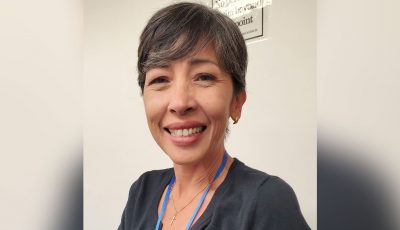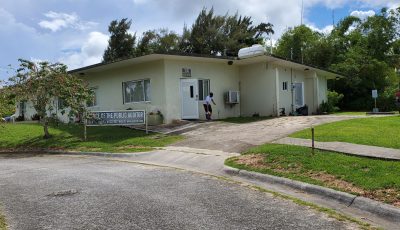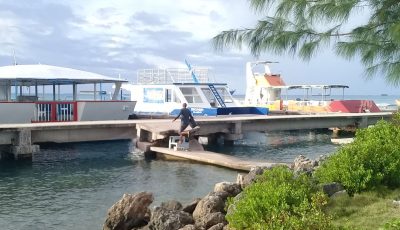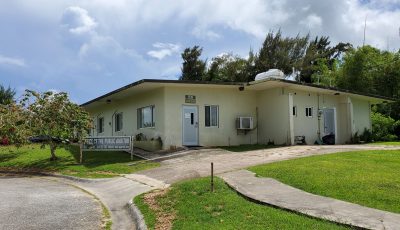Peter: Bill to exempt some from OPA fee would also forgive $40M debt
Of $40M debt, CUC alone owes general fund $20M
The Office of the Public Auditor has taken exception to a proposed bill that not only would exempt some agencies from paying 1% of their budget to OPA but would also forgive a $40 million debt owed the CNMI government. The same bill, House Bill 22-102, will also negatively affect the OPA’s ability to function independently as required by law, according to CNMI Public Auditor Kina B. Peter.
In comments she submitted Tuesday to House of Representatives Speaker Edmund S. Villagomez (Ind-Saipan) on H.B. 22-102, Peter said the bill, as written, rewards public entities’ disregard of the law that created a 1% funding mechanism to ensure that the OPA’s budgetary needs are met and forgives a massive debt owed the CNMI general fund.
Peter is also disappointed that she has to make written comments instead of appearing personally before the House since OPA received no notice of this measure being on the House session’s agenda on Rota yesterday.

Peter
She said travel arrangements were impossible at this late hour and it is her hope that her letter will adequately communicate the importance of Villagomez’s full attention to the underlying issues raised in the bill.
Villagomez is the main author of H.B. 22-102, that seeks to exempt public corporations and autonomous agencies from paying the 1% Public Auditor fee. Villagomez stated in the legislation that the exemption provides financial relief to the autonomous agencies and public corporations that do not utilize the audit service of the OPA in the first place.
For example, Villagomez said, CPA is required by its bond indentures to file its complete financial statements, together with an audit report and opinion of an independent certified public accountant that is nationally recognized in the U.S. and a certificate that CPA is in compliance with its bond payment.
Villagomez said an additional concern for CPA is that the Public Auditor fee, as a general charge imposed upon CPA annually, constitutes revenue diversion from CPA that would violate federal entitlement or discretionary grant conditions or jeopardize such grants for airport or seaport improvements.
Similarly, he said, the Commonwealth Utilities Corp. hires its own independent auditor for its annual audit.
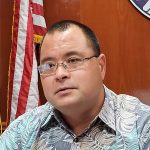
Villagomez
In OPA’s comments, Peter noted that the estimated past due amounts from all autonomous agencies total approximately $40 million, with CUC alone making up approximately $20 million of the total amount due.
Peter pointed out that, according to Article 3, Section 12 of the NMI Constitution, “any unencumbered fund balance in a fiscal year shall be available for general appropriation.”
The public auditor emphasized that the outstanding balance does not go to OPA’s account.
She said this $40 million balance goes back to the CNMI government general fund and is available for appropriations by the House.
For example, Peter said, the $20 million owed the general fund from CUC could be used as offset for CNMI government utility bills.
“We urge you to consider the future financial situation of the CNMI and how much of a difference $40 million could make to the general fund,” she told Villagomez.
She pointed out that, the CNMI created the 1% funding mechanism for OPA’s budgetary needs in order to remain independent and free from political interference through the appropriations process.
She said according to 1 CMC Section 7831, OPA is supposed to be funded by 1% of all locally generated funds.
However, in reality, Peter said, OPA’s funding under such law, which requires the same 1% contribution to OPA from CNMI public corporations and autonomous agencies, has been at risk because nearly all such agencies regularly ignore the law of the Commonwealth.
She said as a direct result of the autonomous agencies’ failure to pay their annual share of the required 1% funding to OPA, OPA has been faced with significant downsizing.
Peter cited an example in 2004 when OPA had five audit managers, 14 audit staff members, two attorneys, and five investigators. Currently, she said, OPA has one audit manager, seven audit staff members, one attorney, one investigations manager, and four investigators.
Peter said H.B. 22-102 would not hold the autonomous agencies and public corporations accountable for their non-compliance and it would directly threaten OPA’s ability to fulfill its constitutional and legislative mandates.
She said OPA is the back stop for honesty and accountability for all three branches of the government and has been recognized by the CNMI Supreme Court as the “sentinel against government malfeasance.”
The public auditor said the findings and purpose in H.B. 22-102 that “certain autonomous agencies and public corporations do not utilize the audit service of OPA” is misleading.
“While certain audit services are contracted directly by some autonomous agencies, there are many services provided by OPA to provide oversight for all aspects of the government, including the autonomous agencies, to include: performance audits, investigations, ethics act investigations, assistance with the elections, and other statutory mandates,” she said.
Furthermore, Peter said, the suggested fee structure in H.B. 22-102 is unsustainable in light of the many roles that OPA plays within the CNMI government.
She said quantifying the costs for investigations, elections, and other statutorily mandated services would be difficult.
She said OPA would be putin a compromising situation to have to identify its own revenue stream, potentially impairing its independence.
Peter said H.B. 22-102 asserts that OPA’s 1% fee would violate federal entitlement for the Commonwealth Ports Authority.
She said to date, there has not been a determination that OPA’s 1% fee puts CPA or other agencies at a financial risk with their federal grantors.
Peter said since she took office, she has taken steps to meet with various agencies to discuss OPA’s 1% fee but the agencies have taken their concerns lightly and this issue continues to be unresolved due to almost 26 years of non-compliance with the law.
She requested Villagomez to consider the potential consequences of waiving this debt and reducing OPA’s budget.
The public auditor said the CNMI government has been receiving an unprecedented amount of federal money and the demands for OPA’s services have never been higher.
“We will not be able to adequately meet our mandate of detecting fraud, waste, and abuse of funds if we have to reduce our budget,” she said.



